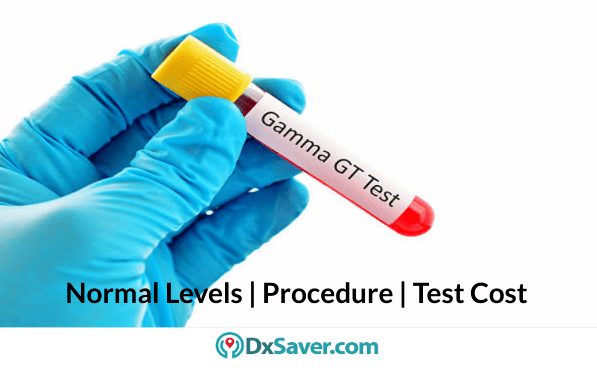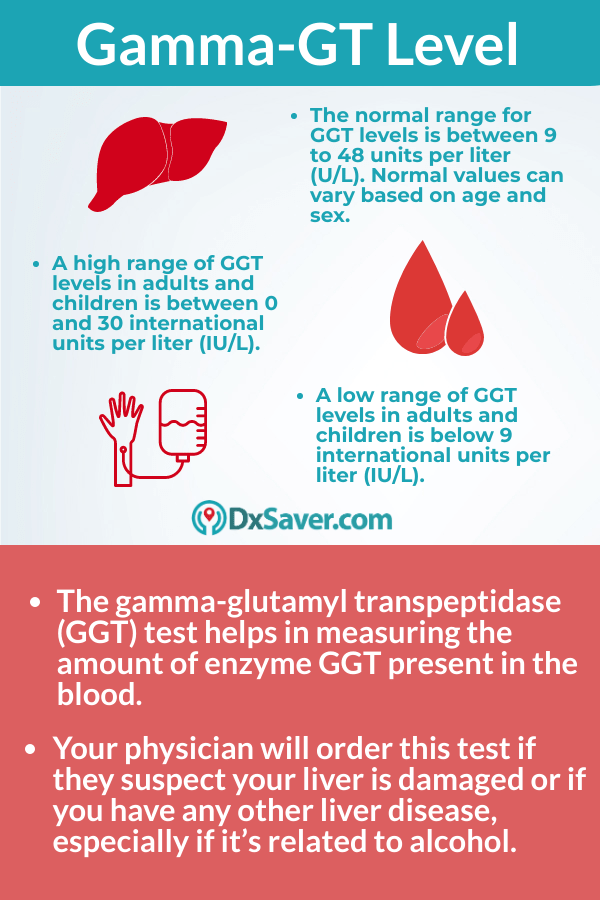
Gamma-Glutamyl Transpeptidase is a concentrated enzyme in the liver. Gamma-GT is also present at the gallbladder, spleen, kidneys, and pancreas. GGT levels are high when there is liver damage. GGT test is usually done with other tests that measure liver enzymes if there’s a possibility of liver damage.
The article below will cover the significant and relevant topics of the GGT blood test that includes the test cost of GGT, why is GGT test done, how the test is performed, Preparation before the test, Risk factors, Normal, high and low range of GGT blood test & Labs for GGT test.
- GGT blood test cost
- Why is the GGT blood test needed?
- How is the GGT blood test count performed?
- Is there any preparation required before the test?
- Are there any risks in the test?
- What does the test result mean?
- Is the test result always accurate?
- Normal GGT levels
- High GGT level
- Low GGT level
- Providers Locations
GGT blood test cost
The gamma-glutamyl transpeptidase/GGT blood test cost ranges between $45 and $49 in different labs and facilities across the United States. No prior appointment is required to get tested for GGT. Compare the price, order your test online and visit the nearest lab during business hours to get tested. After completing the test procedures, results will be mailed to you in 2 to 3 business days. We also provide doctor consultation for further treatment and for any kind of health advice.
The following table shows the GGT blood test cost at 2 of our partner laboratories (CLIA – Certified) network located across the United States.
Name of our Partner Labs | Book Online |
HealthLabs
| Offer Price$49 |
Personal Testing Lab
| Offer Price$45 |
GGT blood test cost with insurance
Many health insurance policies in the U.S. cover the cost for the GGT blood test. However, the coverage of private health insurance companies and national health insurance programs like Medicare and Medicaid varies accordingly. So we recommend you to check your health insurance plan before getting tested for GGT blood test.
Our GGT blood test providers do not accept any health insurance. Although, on request, they can provide you with an itemized receipt containing all the details like the name and code of the test, and CPT code which is necessary for insurance reimbursement purposes.
What is a GGT blood test?
The Gamma-glutamyl transpeptidase (GGT) test helps in measuring the amount of enzyme GGT present in the blood. Enzymes are those molecules which are necessary for chemical reactions in your body. Normally, GGT functions in your body as a transport molecule, which helps in moving other molecules around your body. It plays a vital role in helping the liver metabolize drugs and other toxins.
Why is the GGT blood test needed?
The liver produces proteins in your body and filtering out poisons. It also makes bile- a substance that helps your body in processing fat content. Your physician will order this test if they suspect your liver is damaged or if you have any other liver disease, especially if it’s related to alcohol. The GGT test is currently the only sensitive enzymatic indicator of liver damage and another liver-related disease. This damage is often caused by heavy consumption of alcohol or other toxic substances, like drugs and poisons.
The symptoms of liver problems may include:
- Decreased appetite
- Nausea or vomiting
- Lack of energy
- Abdominal pain
- Jaundice
- Unusually dark urine
- Light-colored feces
- Itchy skin
Your physician might order the GGT test to check whether you are following the treatment program when you’ve finished alcohol rehabilitation and you’re trying to abstain from alcohol. The test can also monitor GGT levels for those who have been treated for alcoholic hepatitis.
How is the GGT blood test count performed?
A GGT level can be measured using a regular blood test. For the GGT blood test, the blood is drawn from your arm at the crease of the elbow. The lab professional will put an elastic band around your arm to make your veins more prominent and visible. They will draw blood through a syringe and collect it in a vial for analysis purposes. You may feel a sting when the needle is inserted at first and also you might feel throbbing and have a small bruise later.
Is there any preparation required before the test?
Your physician may ask you to fast for eight hours before the test and also to stop taking few medications. If you consume even a small amount of alcohol within 24 hours of your test, it will affect your test results.
Are there any risks in the test?
Getting your blood drawn from the body is a low-risk procedure. There’s a chance of slight bleeding at the insertion area or of getting a hematoma which is a blood bruise caused under your skin. Infections may occur only in very rare cases. Any blood test, there’s a risk of bleeding, bruising, and infection at the puncture wound.
What does the test result mean?
The GGT test result should be available the following day itself. Your physician will help you interpret them and assess if they’re in the normal range or at high and low range. According to the Mayo Clinic, the normal range for GGT levels is between 9 and 48 units per liter (U/L). Normal values can vary based on age and sex.
The GGT test helps to diagnose any liver damage or disease, but it can’t determine the cause or the reason. If the GGT level is elevated, then probably you have to undergo other tests as well. Generally, the higher the GGT level the greater the chance of damage to your liver.
Some of the conditions that result in higher GGT range are:
- Overuse of alcohol
- Chronic viral hepatitis
- Lack of blood flow to the liver
- Liver tumor
- Cirrhosis
- Overuse of drugs or toxins
- Heart failure
- Diabetes
- Pancreatitis
- Fatty liver disease
Gamma-GT is measured relative to another enzyme called alkaline phosphatase. If GGT and ALP are both elevated, the physician will suspect that you have serious problems with your liver or the bile ducts. If the Gamma-glutamyl transpeptidase is normal and ALP is higher, this could indicate bone disease or any other disease. Your physician may use the GGT test to rule out certain problems.
The liver-alcohol disease can influence GGT levels
If your physician thinks your use of medicines or alcohol is affecting the test results, they might want you to get tested again. Consumption of barbiturates, phenobarbital, and no prescribed drugs can increase the levels of Gamma-glutamyl transpeptidase in your body. Usually, the levels in GGT increase with age in women, but not in men. If you have recently stopped consuming alcohol frequently, it can take up to a month for your GGT level to fall to normal count. Smoking also has a high risk of increased GGT levels.
Normal GGT level
A person with a normal GGT test probably does not have any liver disease or damage. When someone has undergone treatment for alcohol use disorder and they show normal reading, then it means that they have not had any alcoholic drink recently. The normal range for GGT levels is between 9 to 48 units per liter (U/L). Normal values can vary based on age and sex. The GGT helps to diagnose liver damage, but it can’t determine the cause or the reason. If your GGT level is elevated, you’ll probably have to undergo more tests. GGT levels will rise according to the amount of liver damage or liver disease an individual has.

High GGT level
A high range of GGT levels in adults and children is between 0 – 30 international units per liter (IU/L). Newborn infants will have significantly higher levels after they are born. High GGT levels may occur due to many reasons, so your physician will use the GGT test considering other tests for diagnosis.
1) Liver or bile duct damage
GGT levels are usually the first reason to rise when a person has a bile duct obstruction, the most sensitive liver enzyme test used for detecting problems related to the bile duct.
The Gamma-GT test is also a part of series of tests known as a liver panel, which checks the levels of other liver enzymes present in your body such as alanine aminotransferase (ALT), aspartate aminotransferase (AST), alkaline phosphatase (ALP), and bilirubin.
2) Chronic alcohol abuse
Gamma-GT levels tend to be higher in people who drink heavily on a regular basis compared with people who drink in moderation or those who drink heavily on occasion. The physician may measure GGT levels to test for chronic alcohol abuse or acute alcohol abuse.
Your physician may opt for this test to check alcohol usage in someone who is receiving treatment for alcohol abuse disorder or hepatitis due to chronic alcohol use.
How to lower high GGT levels?
Over time, the GGT level will fall from a higher level to the normal range when you stop consuming alcohol. To reach a normal level, it can take several weeks to more than a month. Stopping the consumption of alcohol will decrease your chances of damaging your liver and it allows your liver function to improve.
Low GGT levels
A low range of GGT levels in adults and children is below 9 international units per liter (IU/L).
The low range of GGT may also be caused due to alcohol abuse, alcoholic liver disease, or the use of drugs that are harmful to your liver. A low GGT test result indicates that you have liver disease or have consumed any alcohol.
How to increase low GGT levels?
There is no specific treatment that exists for individuals who have low GGT levels. Treatment is decided based on the specific symptoms that vary in each individual. Some of the treatment options may include drug therapy, surgical procedures, and advanced cases of liver transplantation. Restoring vitamins and nutrients lost because of malabsorption is important in many cases.
Providers Locations
The GGT blood test can be done in any of the following locations across the U.S. by visiting the nearest lab.
- Alabama
- Alaska
- Arizona
- Arkansas
- California
- Colorado
- Connecticut
- Delaware
- Florida
- Hawaii
- Georgia
- Idaho
- Illinois
- Indiana
- Iowa
- Kansas
- Kentucky
- Louisiana
- Maine
- Michigan
- Minnesota
- Mississippi
- Missouri
- Montana
- Nebraska
- Nevada
- New Hampshire
- New Mexico
- North Carolina
- North Dakota
- Oklahoma
- Oregon
- Pennsylvania
- Puerto Rico
- South Carolina
- South Dakota
- Tennessee
- Texas
- Utah
- Vermont
Frequently Asked Questions
Will insurance cover my testing cost?
No, insurance will not be covered in the billing. However, they will provide you a receipt for insurance reimbursement purposes.
How should I book my appointment?
You can choose the most suitable provider from above and make an appointment by following the instructions mentioned by them.
Can I cancel my lab test order?
Yes, you can cancel your lab test order anytime before your testing. A refund will be initiated after deducting the cancellation fee. However, cancellation is at the discretion of the provider.
Do the providers offer result interpretations?
Yes, a few providers may provide doctor consultation who will take you through the results and provide clarification if needed.
How do I receive my report?
To ensure your privacy, the test report will be mailed to you by the provider.
Other topics you may be interested in:-
- How Much Does At-Home COVID-19 Home Test Kit Cost in the U.S?
- What are the Types of Skin Cancer?
- ANA Test Cost in the US
- Anti-aging Testing Cost in the US
- Signs and Symptoms of Oral Syphilis
- Is Mycoplasma Genitalium an STD?
- Types of STDs that cannot be cured
- How Much Does At-Home Drug Test Kit Cost in the US?
- Top 20 Foods to Keep Diabetes in Control
- Is Itching a Symptom of STD?
- Blood Tests for Fertility & Pregnancy Hormones
- Top 10 Foods to Trim Excess Weight
- C-Peptide Normal Levels, Test Results & Treatment
- Herpes Vs. HPV: Differences, Symptoms, and Testing Cost
- Importance of CA 125 Testing & Ovarian Cancer in Women
- Oral STDs: Names, Symptoms, Treatment and Testing Cost
- Colon Cancer Stages | Know more about Early Symptoms, Causes & Treatment
- Symptoms of Pancreatic Cancer | More about Causes, Diagnosis & Treatment






